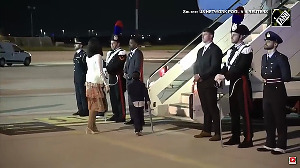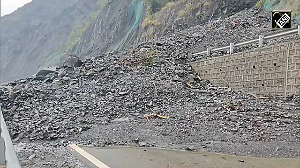Opposing New Delhi's stand against Tehran at a recent meeting of the International Atomic Energy Agency, the Left parties on Wednesday asked the government to assure the world community that it would not allow the Iran nuclear issue to be raised at the UN Security Council.
"We demanded that India should assure the world that we will not allow the issue to be raised at the Security Council," Communist Party of India-Marxist leader Sitaram Yechury told reporters after a 75-minute meeting with Prime Minister Manmohan Singh.
The prime minister, accompanied by Defence Minister Pranab Mukherjee and Foreign Secretary Shyam Saran, explained to Left leaders the circumstances in which India voted for a European Union resolution against Iran on its nuclear capabilities.
Yechury, who was accompanied by leaders of CPI and RSP, said, "The vote was not of any consequence to the final outcome. It was a positioning vote which unfortunately gives the impression that India is aligning with the US on the matter."
He said the vote also went against the UPA's Common Minimum Programme, which says the government should follow an independent foreign policy and oppose 'hegemonistic approach' by any country.
The defence minister, who also briefed the media, acknowledged the government's differences with the Left parties on the issue.
"Different parties have different perceptions. They also presented their perceptions at the meeting convened by the prime minister," he added.
CPI leaders A B Bardhan and D Raja and RSP's Abani Roy accompanied Yechury at the meeting.
Maintaining that such a stand could affect India's energy security interests at a time when New Delhi and Tehran have agreed to construct a gas pipeline through Pakistan, the CPI-M leader said, "We are not convinced by the explanation given by the government and our differences remain. India should have abstained from voting."
He said even if the IAEA resolution was taken up at the UN Security Council, it would not be adopted since both Russia and China-- permanent members of UNSC with veto powersdid not agree with it at the Vienna meeting.
"Therefore, there was no need for India to position itself in a manner which clearly indicates that it was siding with the US, especially when we are in a position to lead the developing world today," Yechury said.
Asked about reports that Iran had rejected the LNG deal with India following the IAEA vote, he said, "It shows as if we are sacrificing out vital national interests to keep the US happy."
On the future course of action, CPI leader Raja said the Left parties would sit together and decide on it. The CPI-M has earlier said India's favouring the resolution 'virtually converted it into an ally of the United States' and such a stand has caused 'immense damage' to India's non-aligned stand.
The CPI said that 'suspicion' of the West on Iran's nuclear programme were as much substantiated as were the findings of weapons of mass destructions in Iraq.







 © 2025
© 2025